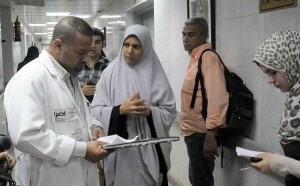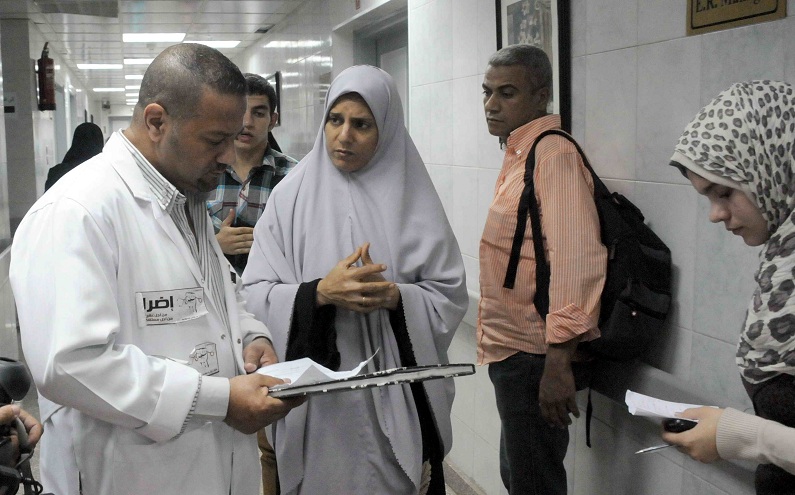
Mohamed Omar
Doctors across Egypt have been on strike for three days now and say it is costing the Ministry of Health millions of pounds.
Their strike is a partial one, so emergency rooms, intensive care units, blood transfusion centers, and other essential services have stayed open so as not to abandon their patients. What has been halted, with around 80% national participation, is the out-patient clinics – those that do not require patients to stay overnight.
“The out-patient clinics make a lot of money for the Ministry of Health,” said Dr Mohamed Shafiq, one of the press committee members of the Doctors Syndicate’s higher strike committee. “These out-patient clinics bring in about EGP 25,000 per day, and based on the number of hospitals striking, we know that the strike is costing the ministry between eight and ten million Egyptian pounds per day.”
Dr Moustafa Al-Beheiry, a doctor who recently ended his hunger strike, said there were a few skirmishes on Wednesday between patients and doctors, he named Gamaliya Hospital in Dahaleya and Mit Ghamr Hospital as two locations.
“In Mit Ghamr the doctors were insisting to continue the strike, and admit patients for free, but the head of the hospital insisted on waiting for patients to pay entrance fees,” said Al-Beheiry, adding, “doctors have in their minds to maintain this strike till their demands are replied to.”
“This is a big strike and of course there is going to be some fights, especially because the media is trying to scandalise the doctors and turn the citizens against us,” said Shafiq. “We are recording every conflict, and amazingly, it is very low, especially considering how many attacks happen to doctors normally.”
Protection against these attacks on doctors while they are working is one of the strikers’ three demands. There has been a spike in violence in emergency rooms across Egypt where doctors and patients are particularly exposed and vulnerable. The doctors and some hospital managers are saying that they desperately need more security from the state.
“There will be an acceleration in the government’s actions on the issues of security, budget, and new laws that they asked for,” said Mohammed Rakha from Doctors without Borders. “There will be an expediation because of the strike and I hope there will be some sort of real action on the ground. We just need a time plan for these; we don’t need them right now.”
Indeed, the other two demands will take time.
“We want the Ministry of Health’s budget to be raised to 15% [of the overall budget], according to international commitments,” said Shafiq. “The current budget for 2012-2013 is 3.8%.”
Shafiq said that President Mohammed Morsy has promised, speaking with the syndicate through his advisors, that he will increase the budget of health to 7% and gradually increase it during his tenure until it reaches 12%. However, Al-Beheiry said, “we want decisions, not promises.”
The final demand President Morsy cannot even promise to meet, which is the doctors’ request for a special group that would represent the interests of all medical professionals. Said Shafiq, “we want the president to make a special cadre for those providing medical services, doctors, nurses, dentists, pharmacists, all sorts of medical professions. This cadre will look out for medical professionals’ social, educational, and financial security.”
The doctors were told that they cannot be granted this cadre because then teachers, engineers, and other professional groups would demand one. According to Shafiq, the doctors countered saying they would not need this cadre if they were provided with minimum and maximum wage laws, but until then, they would demand a temporary body looking out for their rights.
Regardless if any of the demands are met, the strike is certainly highlighting the doctors’ plight and putting it into the national dialogue. Said Rakha, “I think that this strike, which has big participation, will pose our problems to the public.”

